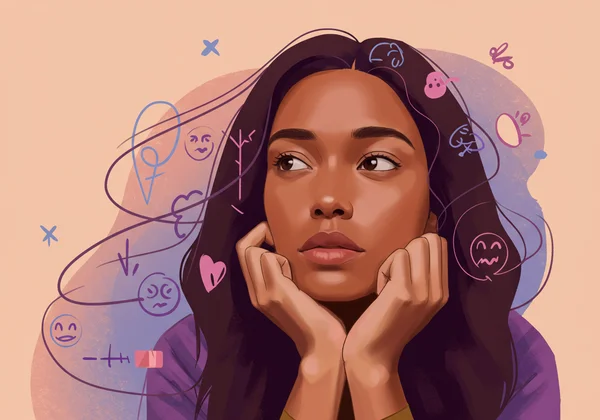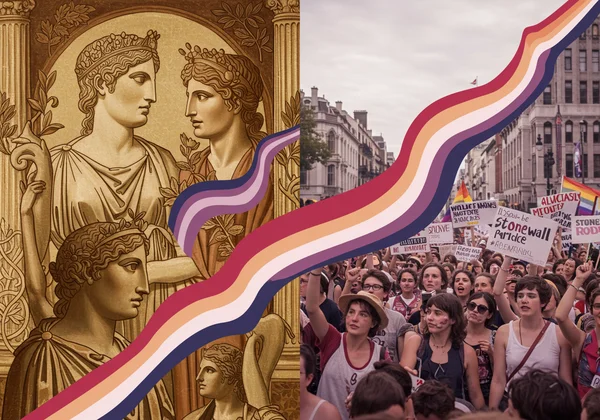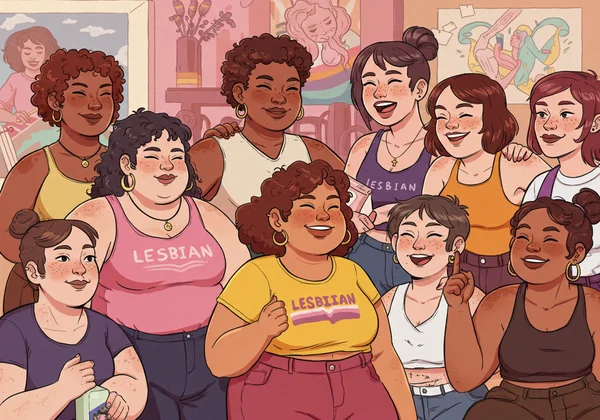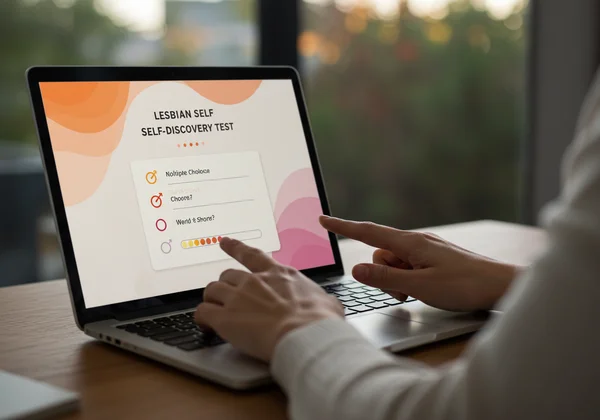लेस्बियन होने का क्या मतलब है? आत्म-खोज के लिए हमारा लेस्बियन टेस्ट लें
एक सौम्य अन्वेषण और समझ के स्थान में आपका स्वागत है। यदि आप इसे पढ़ रहे हैं, तो आप अपनी भावनाओं, अपने आकर्षण और अपनी पहचान के बारे में प्रश्न पूछ रहे होंगे। प्रश्न लेस्बियन होने का क्या मतलब है एक गहरा प्रश्न है, और यह एक यात्रा है, कोई गंतव्य नहीं। आप यह भी सोच रहे होंगे, मुझे कैसे पता चलेगा कि मुझे लड़कियाँ पसंद हैं? जान लें कि आत्म-खोज की इस प्रक्रिया में आप अकेले नहीं हैं। यह मार्गदर्शिका आपके साथ चलने के लिए यहाँ है, जो आपको स्पष्टता और समर्थन प्रदान करती है क्योंकि आप यह पता लगाते हैं कि लेस्बियन पहचान का क्या अर्थ हो सकता है। यदि आप इन भावनाओं को अधिक व्यक्तिगत रूप से तलाशने के लिए तैयार महसूस करते हैं, तो आप हमेशा एक सहायक उपकरण के साथ अपनी यात्रा शुरू कर सकते हैं।
लेस्बियन पहचान को समझना: केवल आकर्षण से कहीं ज़्यादा
मूल रूप से, लेस्बियन होने का मतलब है कि आप एक ऐसी महिला हैं जो रोमांटिक, भावनात्मक या यौन रूप से अन्य महिलाओं के प्रति आकर्षित होती हैं। फिर भी, यह लेस्बियन पहचान को समझने की सिर्फ़ शुरुआत है। यह एक समृद्ध, बहुआयामी अनुभव है जो एक साधारण लेबल से परे है, जिसमें यह शामिल है कि आप खुद को कैसे देखते हैं, दूसरों से कैसे जुड़ते हैं, और दुनिया में कैसे रहते हैं। अंततः, यह एक व्यक्तिगत सत्य है जिसे केवल आप ही परिभाषित कर सकते हैं।

लेस्बियनवाद को परिभाषित करना: साधारण लेबलों से परे
कई लोगों के लिए, लेस्बियन के रूप में पहचान करना आत्म-स्वीकृति का एक शक्तिशाली कार्य है। यह एक ऐसा शब्द है जो समुदाय और अपनेपन की भावना प्रदान कर सकता है। रूढ़िवादिता से आगे बढ़ना महत्वपूर्ण है; लेस्बियन होने का कोई एक तरीका नहीं है। यह पहचान अभिव्यक्तियों, व्यक्तित्वों और जीवन के अनुभवों के एक विशाल स्पेक्ट्रम को समाहित करती है। यह इस बारे में नहीं है कि आप कैसे कपड़े पहनते हैं या आपके शौक क्या हैं, बल्कि आपके आकर्षण और भावनात्मक संबंधों की मूलभूत प्रकृति के बारे में है। अपने लिए लेस्बियनवाद को परिभाषित करने की यह प्रक्रिया यात्रा का एक महत्वपूर्ण हिस्सा है।
आकर्षण का स्पेक्ट्रम और यौनिकता का प्रवाह
मानवीय आकर्षण हमेशा काला और सफेद नहीं होता। आप आकर्षण के स्पेक्ट्रम जैसे शब्द सुन सकते हैं, जो स्वीकार करता है कि भावनाएँ जटिल हो सकती हैं। कुछ महिलाएँ कम उम्र से जानती हैं कि वे लेस्बियन हैं, जबकि अन्य जीवन में बाद में महिलाओं के प्रति अपने आकर्षण की खोज करती हैं। यहीं पर यौनिकता का प्रवाह की अवधारणा आती है। यह पहचानती है कि हमारे आकर्षण और पहचान समय के साथ विकसित हो सकते हैं। किसी भी उम्र में अपनी यौनिकता पर सवाल उठाना पूरी तरह से सामान्य है। खुद को बिना दबाव के अन्वेषण करने की अनुमति देना आपके द्वारा किए जा सकने वाले सबसे दयालु कामों में से एक है। यदि आप इन विचारों को संसाधित करने के लिए एक सुरक्षित स्थान की तलाश में हैं, तो एक गोपनीय लेस्बियन टेस्ट एक सहायक पहला कदम हो सकता है।
लेस्बियन इतिहास और संस्कृति पर एक नज़र
यह समझना कि आप कहाँ से आते हैं, यह स्पष्ट कर सकता है कि आप अभी कहाँ हैं। लेस्बियन पहचान नई नहीं है; इसका एक गहरा और लचीला इतिहास है, जो संघर्ष, खुशी और गहरे जुड़ाव के क्षणों से भरा है। इस इतिहास को जानने से अपनेपन और सत्यापन की एक शक्तिशाली भावना पैदा हो सकती है।

लेस्बियन इतिहास का पता लगाना: समय के साथ दृश्यता और लचीलापन
लेस्बियन हमेशा से अस्तित्व में रही हैं, तब भी जब समाज ने उन्हें अदृश्य बनाने की कोशिश की। ग्रीक द्वीप लेस्बोस पर सैफ़ो की कविता (जहाँ "लेस्बियन" शब्द की उत्पत्ति हुई है) से लेकर स्टोनवॉल विद्रोह के बहादुर कार्यकर्ताओं तक, महिलाओं ने पूरे इतिहास में महिलाओं से प्यार किया है। ऐतिहासिक लेस्बियन हस्तियों और दृश्यता के लिए संघर्ष के बारे में जानने से ताकत की विरासत का पता चलता है। यह इतिहास लेस्बियन प्रेम और पहचान की स्थायी प्रकृति का प्रमाण है। इसे महसूस करने से आपकी अपनी यात्रा कम अलग-थलग और लचीली महिलाओं की एक लंबी पंक्ति से अधिक जुड़ी हुई महसूस हो सकती है।
लेस्बियन संस्कृति के तत्व: समुदाय, कला और प्राइड
लेस्बियन संस्कृति साझा अनुभवों से बुनी हुई एक जीवंत टेपेस्ट्री है। यह संगीत समारोहों, साहित्य, कला और ऑनलाइन स्थानों में पाई जाती है जहाँ महिलाएँ एक-दूसरे से जुड़ती हैं और उनका समर्थन करती हैं। लेस्बियन समुदाय केंद्रीय है, जो उन लोगों के लिए एक चुना हुआ परिवार प्रदान करती है जिन्हें कहीं और स्वीकृति नहीं मिली होगी। प्राइड परेड जैसे कार्यक्रम इस पहचान और की गई प्रगति का एक आनंदमय उत्सव हैं। इस संस्कृति से जुड़ना आपकी अपनी भावनाओं को प्रतिबिंबित और मनाया जाता हुआ देखने का एक सशक्त तरीका हो सकता है। यह एक व्यक्तिगत पहचान को एक साझा, सकारात्मक अनुभव में बदलने में मदद करता है। कई लोगों के लिए, इस समुदाय की ओर पहला कदम क्या मैं लेस्बियन हूँ टेस्ट जैसे उपकरणों के माध्यम से खुद को समझना है।
आधुनिक लेस्बियन जीवन: आज विविधता और सूक्ष्मता
आज, लेस्बियन पहचान पहले से कहीं ज़्यादा दृश्यमान और विविध है। लेस्बियन होने की आधुनिक समझ समावेशिता को गले लगाती है और उन कई अलग-अलग तरीकों को स्वीकार करती है जिनसे इस पहचान को व्यक्त और जिया जा सकता है। यह व्यापक LGBTQ+ बातचीत का एक गतिशील और विकसित होता हिस्सा है।

लेस्बियनवाद की विविध अभिव्यक्तियों को अपनाना
लेस्बियन समुदाय में व्यक्तियों की एक सुंदर श्रृंखला शामिल है। इसमें बुच और फेम पहचान, एंड्रोजिनस महिलाएँ, ट्रांस महिलाएँ जो लेस्बियन हैं, और गैर-बाइनरी लोग शामिल हैं जो लेस्बियन लेबल के साथ पहचान करते हैं। विविध लेस्बियन पहचानें हैं, और कोई भी दूसरे से ज़्यादा मान्य नहीं है। यह समावेशिता एक ताकत है, यह सुनिश्चित करती है कि ज़्यादा लोग इस शब्द के भीतर एक घर पा सकें। यदि आप इस स्पेक्ट्रम में अपनी जगह तलाश रहे हैं, तो याद रखें कि आपकी अनूठी अभिव्यक्ति मान्य है। हमारा लक्ष्य आपको अपनी भावनाओं का अन्वेषण करने में सुरक्षित और पुष्टि करने वाले तरीके से मदद करना है।
रिश्तों, प्यार और सहायता प्रणालियों को नेविगेट करना
स्वस्थ और पूर्ण रिश्ते बनाना एक सार्वभौमिक इच्छा है। लेस्बियन के लिए, इसमें समान-लिंगी साझेदारी के सुखों और चुनौतियों को नेविगेट करना शामिल है। मजबूत लेस्बियन सहायता समूह खोजना, चाहे दोस्तों, परिवार या सामुदायिक समूहों के माध्यम से, भलाई के लिए महत्वपूर्ण है। एक ऐसी दुनिया में संवाद करना, विश्वास बनाना और प्यार का जश्न मनाना जो अभी भी इसे पूरी तरह से गले लगाना सीख रही है, अपने आप में एक यात्रा है। यह प्यार, सम्मान और प्रामाणिक संबंध से भरा जीवन बनाने के बारे में है। आपकी अपनी भावनात्मक ज़रूरतों की गहरी समझ इन स्वस्थ रिश्तों की नींव है, जिसे एक गोपनीय लेस्बियन यौनिकता टेस्ट आपको एक्सप्लोर करने में मदद कर सकता है।
लेस्बियन आत्म-खोज की आपकी निरंतर यात्रा
यह समझना कि लेस्बियन होने का क्या मतलब है एक अंतरंग और व्यक्तिगत प्रक्रिया है। यह सिर्फ़ एक लेबल से ज़्यादा है; यह आप कौन हैं, अपनी भावनाओं को स्वीकार करने और अपना समुदाय खोजने के बारे में है। यह यात्रा विशिष्ट रूप से आपकी है, और इसकी कोई सही या गलत समय-सीमा नहीं है। इन महत्वपूर्ण प्रश्नों को नेविगेट करते समय अपने प्रति धैर्यवान और करुणामय रहें।
आपकी खोज साहस और आत्म-जागरूकता का प्रतीक है। यदि आप इस मार्ग पर आपकी मदद करने के लिए एक सहायक, निजी और व्यावहारिक उपकरण की तलाश में हैं, तो हम आपको पहला कदम उठाने के लिए आमंत्रित करते हैं। लेस्बियन टेस्ट को सुरक्षित और गैर-निर्णायक वातावरण में आपकी भावनाओं पर विचार करने में मदद करने के लिए डिज़ाइन किया गया था।

लेस्बियन पहचान के बारे में अक्सर पूछे जाने वाले प्रश्न
लेस्बियन होने का क्या मतलब है?
लेस्बियन होने का आम तौर पर मतलब है एक ऐसी महिला होना जो मुख्य रूप से रोमांटिक, भावनात्मक और/या यौन रूप से अन्य महिलाओं के प्रति आकर्षित होती है। हालाँकि, यह पहचान बहुत व्यक्तिगत है, और प्रत्येक व्यक्ति इसे अपने लिए परिभाषित करता है। यह इस बारे में है कि आप किससे प्यार करते हैं और आप खुद को कैसे पहचानते हैं।
क्या लेस्बियनवाद एक विकल्प है, या कुछ ऐसा जिसके साथ आप पैदा हुए हैं?
प्रचलित वैज्ञानिक और मनोवैज्ञानिक सहमति यह है कि यौन अभिविन्यास एक विकल्प नहीं है। यह आनुवंशिक, हार्मोनल और पर्यावरणीय कारकों का एक जटिल परस्पर क्रिया है। कई लोगों के लिए, उनका अभिविन्यास उनके अस्तित्व का एक सहज हिस्सा है।
क्या लेस्बियन हमेशा से अस्तित्व में रही हैं, या यह एक आधुनिक घटना है?
लेस्बियन और महिलाओं के बीच प्यार पूरे मानव इतिहास और सभी संस्कृतियों में मौजूद रहा है। जबकि इन रिश्तों का वर्णन करने के लिए इस्तेमाल की जाने वाली दृश्यता और भाषा समय के साथ बदल गई है, महिलाओं से प्यार करने वाली महिलाओं का अस्तित्व कोई आधुनिक आविष्कार नहीं है।
मुझे कैसे पता चलेगा कि मुझे लड़कियाँ पसंद हैं, या यह सिर्फ़ दोस्ताना प्रशंसा है?
यह एक आम सवाल है। प्लेटोनिक प्रशंसा और रोमांटिक आकर्षण के बीच अंतर करना मुश्किल हो सकता है। अपनी भावनाओं की प्रकृति पर विचार करें: क्या आप उनके साथ रोमांटिक या शारीरिक संबंध के बारे में कल्पना करते हैं? क्या आपको उत्साह या "तितलियों" की एक अनूठी भावना महसूस होती है? इन बारीकियों पर विचार करने से स्पष्टता मिल सकती है, और एक मुफ्त लेस्बियन क्विज़ जैसे उपकरण आपको इन सवालों को सुलझाने में मदद करने के लिए डिज़ाइन किए गए हैं।
अगर मैं महिलाओं के प्रति आकर्षित हूँ तो क्या मैं लेस्बियन हूँ या उभयलिंगी?
यदि आप महिलाओं के प्रति आकर्षित हैं, तो आप लेस्बियन, उभयलिंगी, पैनसेक्सुअल हो सकते हैं, या किसी अन्य लेबल से पहचान कर सकते हैं। एक लेस्बियन आमतौर पर विशेष रूप से महिलाओं के प्रति आकर्षित होती है, जबकि एक उभयलिंगी व्यक्ति एक से अधिक लिंगों के प्रति आकर्षित होता है। केवल आप ही यह तय कर सकते हैं कि कौन सा लेबल, यदि कोई हो, आपके लिए सही लगता है। इसे समझने में अपना समय लेना ठीक है।